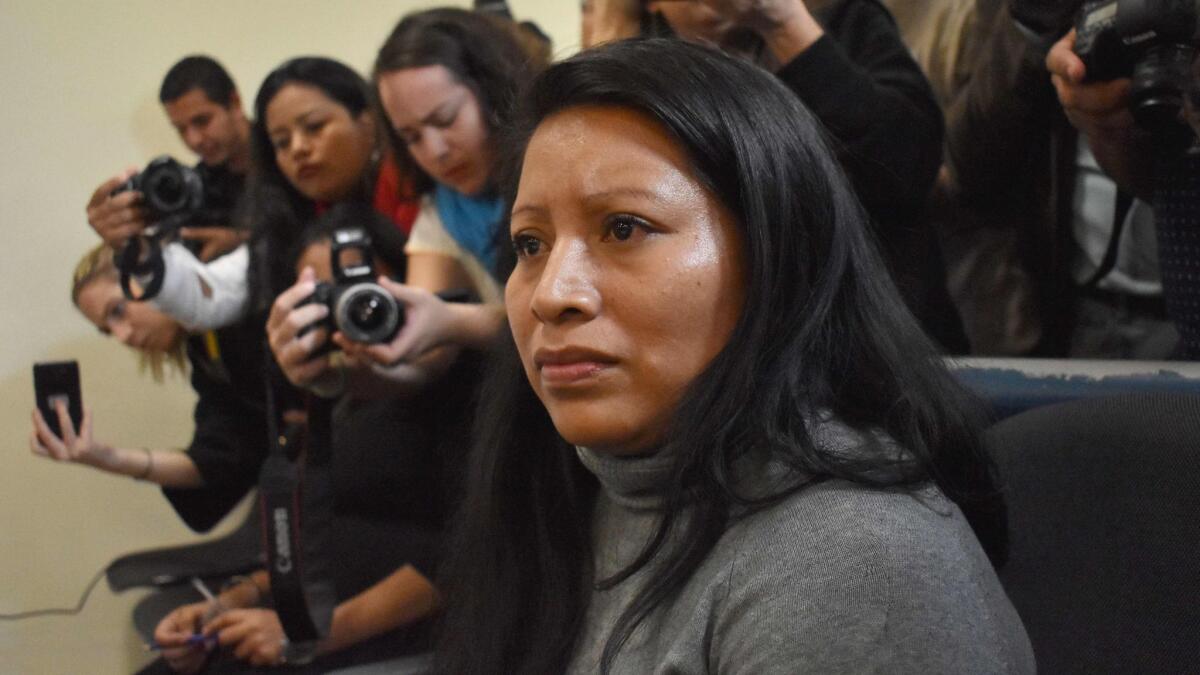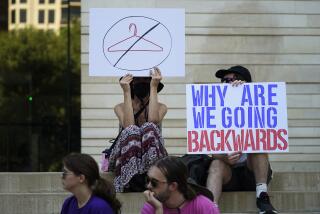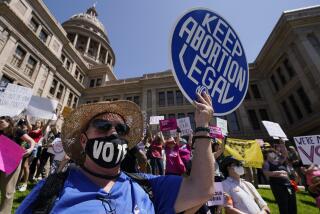A Salvadoran woman says her baby was stillborn. Officials called it a homicide and sent her to prison for 30 years

- Share via
Reporting from MEXICO CITY — Teodora del Carmen Vasquez was nine months pregnant and at work in a school cafeteria when she felt shooting pains in her abdomen.
She dialed an emergency number for help, but none arrived. A few hours later, bleeding profusely and sitting alone in a bathroom stall, she delivered a baby. Vasquez said that she was not conscious for the birth, but that when she came to, the baby was dead.
When authorities finally arrived at the school, they took Vasquez to the hospital in handcuffs. She was convicted of murder and sentenced to 30 years in prison.
That was in 2008. Vasquez is now 34, and has spent nearly a decade behind bars. Her 13-year-old son is being raised by Vasquez’s mother.
In an appeal this month before the same judges who convicted her, her attorney presented two medical studies that he said showed the baby was stillborn, countering a government autopsy that found the baby died of perinatal asphyxia after birth.
On Wednesday, that appeal was denied.
Vasquez is one of dozens of women who have done jail time in connection with their pregnancies in El Salvador, where abortion has been banned under all circumstances since 1998. Even if a woman has been raped or her life is at risk, she can face a prison sentence of up to eight years for having an abortion.
Harsher punishments have been doled out for what women’s rights advocates say were miscarriages or stillbirths. More than a dozen women in such cases have been convicted of aggravated homicide, a charge that can bring a sentence of up to 50 years in prison.
Sara Garcia of the Citizens Group for the Decriminalization of Abortion said those prosecutions and Wednesday’s ruling are proof that women lack basic rights in El Salvador.
“We denounce the Salvadoran state because once more there’s evidence that women’s lives don’t matter,” she said.
According to Amnesty International, suicide accounts for 57% of the deaths of pregnant people ages 10 to 19.
Garcia and other advocates have been fighting for years to change El Salvador’s abortion laws, which are among the strictest on the planet. A female legislator with the ruling Farabundo Marti National Liberation Front, or FMLN, is seeking support for a bill she introduced to the National Assembly that would decriminalize abortion if a pregnancy resulted from rape or the mother’s health is at risk.
But as in the rest of Latin America, where Catholic and evangelical churches hold considerable sway, public opposition to abortion is widespread in El Salvador.
A poll by the Pew Research Center found that 89% of people in El Salvador thought abortion should be illegal in all or most cases.
The poll also found that 45% of people said using contraceptives is morally wrong.
Women’s health advocates say the laws unfairly target the poor, because women with means can afford safer black market abortion procedures. At the same time, they say, the law helps perpetuate poverty. More than a fifth of teenagers ages 15 to 19 have been pregnant at least once, according to the National Family Health Survey. Nearly half of them were younger than 18 and didn’t intend to get pregnant.
Carlos Dada, the founder of the news website El Faro, said the country’s laws favor the rapist over the victim.
“It’s much more likely that a rape victim who aborts her pregnancy will end up in prison than her rapist,” he wrote in an article last year.
Wednesday’s ruling in the Vasquez case drew intense scrutiny in El Salvador and internationally.
U.S. Rep. Norma Torres wrote in a tweet Vasquez was being punished for a tragedy: “No one should be in jail because they have experienced a miscarraige or medical emergency.”
Victor Hugo Mata Tobar, an attorney for Vasquez hired by Amnesty International, said he plans to appeal the decision to the Supreme Court.
To read the article in Spanish, click here
Twitter: @katelinthicum
More to Read
Sign up for Essential California
The most important California stories and recommendations in your inbox every morning.
You may occasionally receive promotional content from the Los Angeles Times.










